Related Research Articles

"Cinderella", or "The Little Glass Slipper", is a folk tale with thousands of variants that are told throughout the world. The protagonist is a young girl living in forsaken circumstances that are suddenly changed to remarkable fortune, with her ascension to the throne via marriage. The story of Rhodopis, recounted by the Greek geographer Strabo sometime between 7 BC and 23 AD, about a Greek slave girl who marries the king of Egypt, is usually considered to be the earliest known variant of the Cinderella story.

"Snow White" is a German fairy tale, first written down in the early 19th century. The Brothers Grimm published it in 1812 in the first edition of their collection Grimms' Fairy Tales, numbered as Tale 53. The original German title was Sneewittchen; the modern spelling is Schneewittchen. The Grimms completed their final revision of the story in 1854, which can be found in the 1857 version of Grimms' Fairy Tales.
A stepfamily is a family where at least one parent has children who are not biologically related to their spouse. Either parent, or both, may have children from previous relationships or marriages. Two known classifications for stepfamilies include "simple" stepfamilies, where only one member of the family's couple has a prior child or children and the couple does not have any children together, and "complex" or "blended" families, where both members of the couple have at least one child from another relationship.
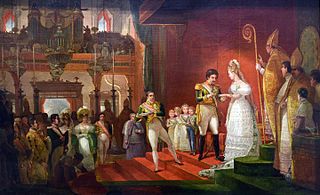
A stepmother, stepmum or stepmom is a non-biological female parent married to one's preexisting parent. Children from her spouse's previous unions are known as her stepchildren. A stepmother-in-law is a stepmother of one's spouse.

In mythology, folklore and speculative fiction, shapeshifting is the ability to physically transform oneself through unnatural means. The idea of shapeshifting is in the oldest forms of totemism and shamanism, as well as the oldest existent literature and epic poems such as the Epic of Gilgamesh and the Iliad. The concept remains a common literary device in modern fantasy, children's literature and popular culture.

"Hansel and Gretel" is a German fairy tale collected by the Brothers Grimm and published in 1812 as part of Grimms' Fairy Tales. It is also known as Little Step Brother and Little Step Sister.

La Cenerentola, ossia La bontà in trionfo is an operatic dramma giocoso in two acts by Gioachino Rossini. The libretto was written by Jacopo Ferretti, based on the libretti written by Charles-Guillaume Étienne for the opera Cendrillon with music by Nicolas Isouard and by Francesco Fiorini for Agatina, o la virtù premiata with music by Stefano Pavesi. All these operas are versions of the fairy tale Cendrillon by Charles Perrault. Rossini's opera was first performed in Rome's Teatro Valle on 25 January 1817.
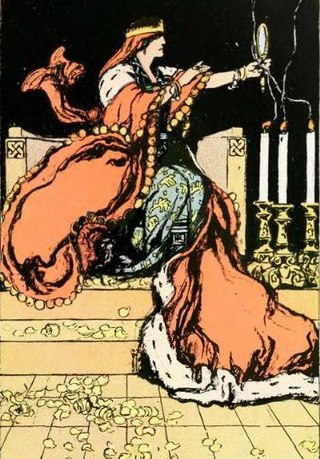
The Evil Queen, also called the Wicked Queen or the Queen, is a fictional character and the main antagonist of "Snow White," a German fairy tale recorded by the Brothers Grimm; similar stories exist worldwide. Other versions of the Queen appear in subsequent adaptations and continuations of the fairy tale, including novels and films. One particularly notable version is Disney's depiction, sometimes known as Queen Grimhilde. The character has also become an archetype that inspired unrelated works.

Yugi Mutou is a fictional character and the main protagonist of the Yu-Gi-Oh! manga series created by Kazuki Takahashi. Yugi is introduced as a teenager who is solving an ancient Egyptian puzzle known as the Millennium Puzzle, hoping it will grant him his wish of forming bonds. After solving the Puzzle, Yugi revives an ancient spirit initially known as Dark Yugi; his true identity is later revealed to be a pharaoh of Ancient Egypt named Atem. Over the course of the series, Yugi forms friendships with the supporting cast, interacts with Atem, and learns about his past. Besides the original manga, Yugi has also appeared in anime adaptations, films and video games based on the franchise. His ace duel monster card is the "Dark Magician".
In Islam, a mahram is a family member with whom marriage would be considered permanently unlawful (haram). A woman does not need to wear hijab around her mahram or spouse, and an adult male mahram or husband may escort a woman on a journey, although an escort may not be obligatory.

In fairy tales, a fairy godmother is a fairy with magical powers who acts as a mentor or parent to someone, in the role that an actual godparent was expected to play in many societies. In Perrault's Cinderella, he concludes the tale with the moral that no personal advantages will suffice without proper connections.

The 10th Kingdom is an American fairytale fantasy miniseries written by Simon Moore and produced by Britain's Carnival Films, Germany's Babelsberg Film und Fernsehen, and the US's Hallmark Entertainment. It depicts the adventures of a young woman and her father after they are transported from New York City, through a magical mirror, into a parallel world of fairy tales.

Prince Charming is a fairy tale stock character who comes to the rescue of a damsel in distress and must engage in a quest to liberate her from an evil spell. This classification suits most heroes of a number of traditional folk tales, including "Snow White", "Sleeping Beauty", "Rapunzel" and "Cinderella", even if in the original story they were given another name, or no name at all.

Happily N'Ever After is a 2006 animated fantasy adventure comedy film directed by Paul J. Bolger, produced by John H. Williams, and written by Rob Moreland. It is inspired by fairy tales of the Brothers Grimm and Hans Christian Andersen and loosely based on the 1999 animated German television series Simsala Grimm. The title is the opposite of a stock phrase, happily ever after; the name is contracted with an apostrophe between the N and the E. The film stars the voices of Sarah Michelle Gellar, Freddie Prinze, Jr., Andy Dick, Wallace Shawn, Patrick Warburton, George Carlin, and Sigourney Weaver. This film was one of Carlin's final works before he died.

"Brother and Sister" is a European fairy tale which was, among others, written down by the Brothers Grimm. It is a tale of Aarne–Thompson Type 450. In Russia the story was more commonly known as "Sister Alionushka, Brother Ivanushka", and collected by Alexander Afanasyev in his Narodnye russkie skazki.
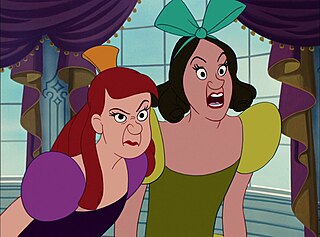
The ugly stepsisters are characters in the fairy tale and pantomime, Cinderella. They are the daughters of Cinderella's wicked stepmother, who treat her poorly. The "ugly stepsisters" have been in variations of the story from as early as researchers have been able to determine.
Step-siblings are children born of two different families who have been joined by marriage. A male step-sibling is a stepbrother and a female is a stepsister. The step-siblings relationship is connected through law and is not a blood relation.
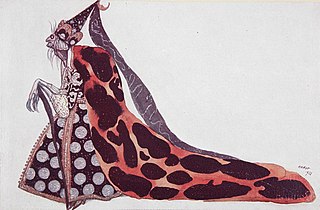
The Wicked fairy is the antagonist of Sleeping Beauty. In some adaptations, she is known as Carabosse. The most notable adaptation of the character is Maleficent, a Disney villain who appeared in various Disney media, beginning with the 1959 Walt Disney film Sleeping Beauty.
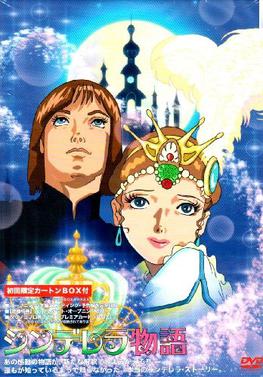
Cinderella is an Italian-Japanese 1996 anime television series based on the fairytale of the same name by Charles Perrault and The Brothers Grimm. It was produced by Tatsunoko Productions and Mondo TV. The series originally aired from April 4 to October 3, 1996, comprising 26 episodes.

The Land of Stories is a series of children's fiction, adventure and fantasy books written by American author, actor and singer Chris Colfer. The first book, The Wishing Spell, was released on July 17, 2012. The sixth book was published in July 2017. Colfer revealed plans for a prequel series in 2016, and has since published three books in this prequel series beginning with A Tale of Magic... in 2019.
References
- ↑ Warner, pp. 213–4